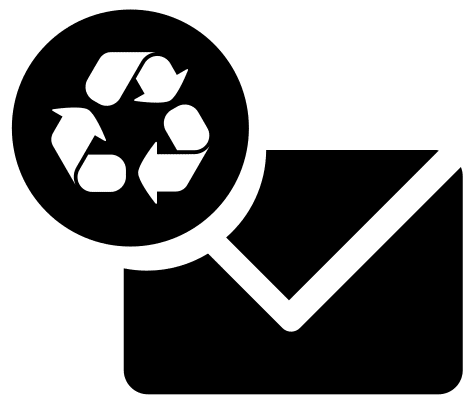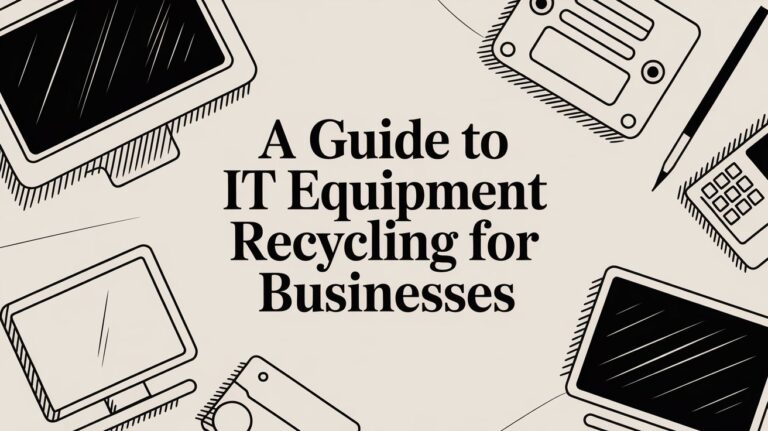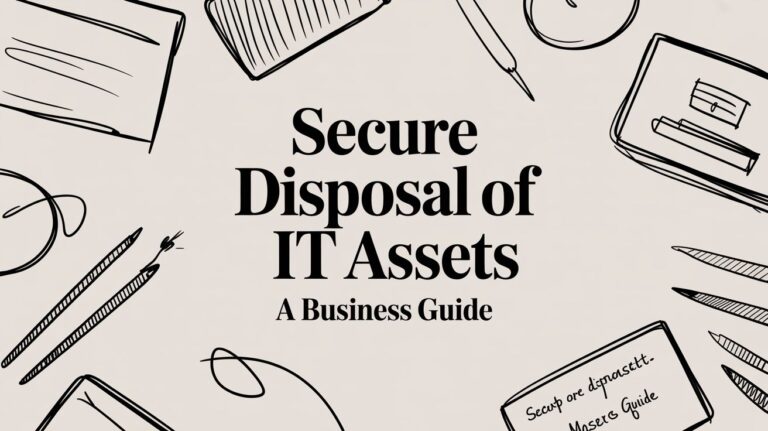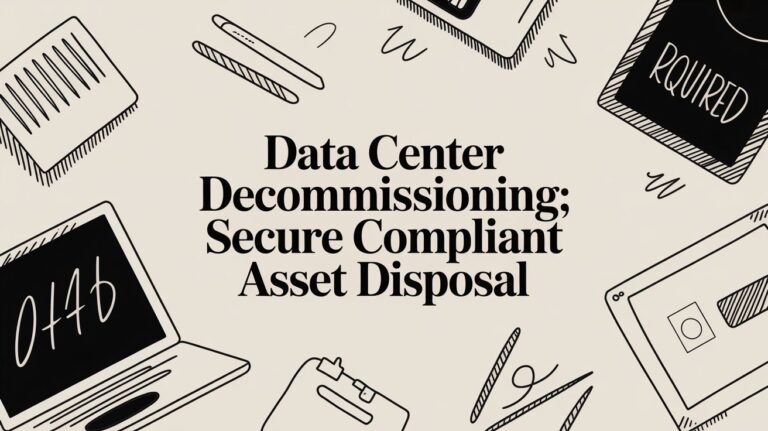When your Atlanta, GA business starts searching for "it equipment recycling near me," it's undertaking a critical task that touches on data security, environmental compliance, and protecting your company's reputation. For commercial enterprises, this process demands a certified partner that provides a secure, fully auditable chain of custody, not just a simple disposal service. The right Atlanta-based IT asset disposal (ITAD) vendor doesn’t just haul away old gear; they provide a certified process to manage these significant business risks head-on.
Why a Specialized Business Recycler Is Essential for Atlanta Companies
For any Atlanta company, from a tech startup in Midtown to a large enterprise in Buckhead, disposing of IT assets is fundamentally different from residential e-waste drop-off. The security and compliance stakes for businesses are exponentially higher. Your typical consumer-focused e-waste service is not equipped to handle the stringent security, data destruction, and documentation requirements of corporate hardware like servers, laptops, and data center equipment.
Your retired servers, employee laptops, and old hard drives contain confidential data—from client lists and financial records to proprietary intellectual property. This sensitive information requires a secure, documented chain of custody from the moment it leaves your facility. A professional ITAD provider specializes in these commercial needs, ensuring your assets are managed securely and in full compliance with all regulations.
The Non-Negotiables in Corporate IT Recycling for Atlanta Businesses
Choosing an IT recycling partner in Atlanta is a strategic business decision that directly impacts your security posture and legal standing. A professional IT Asset Disposition (ITAD) provider delivers services designed specifically for commercial clients, moving far beyond simple disposal to offer comprehensive risk management. To make sure local businesses can find you when they're looking for these services, implementing effective local SEO strategies is absolutely essential.
What separates a true business-focused partner from generic e-waste services?
- Certified Data Destruction: This is the top priority for any business. Your partner must provide data destruction services meeting rigorous standards like NIST 800-88, offering either secure data wiping or physical shredding of storage media.
- Auditable Documentation: Businesses require proof of compliance. A professional vendor will issue a serialized Certificate of Data Destruction and a Certificate of Recycling, providing the legal documentation needed to prove due diligence and transfer liability.
- Compliance with Regulations: A qualified partner must be an expert in environmental laws like the Resource Conservation and Recovery Act (RCRA) and data privacy regulations such as HIPAA, SOX, or GDPR, ensuring your disposal process is fully compliant.
- Secure Logistics and Pickup: Professional ITAD services for Atlanta businesses include secure, scheduled pickups directly from your location, maintaining a documented chain of custody from your door to their certified facility. For more on this, our guide on electronics recycling services near you breaks down what to look for.
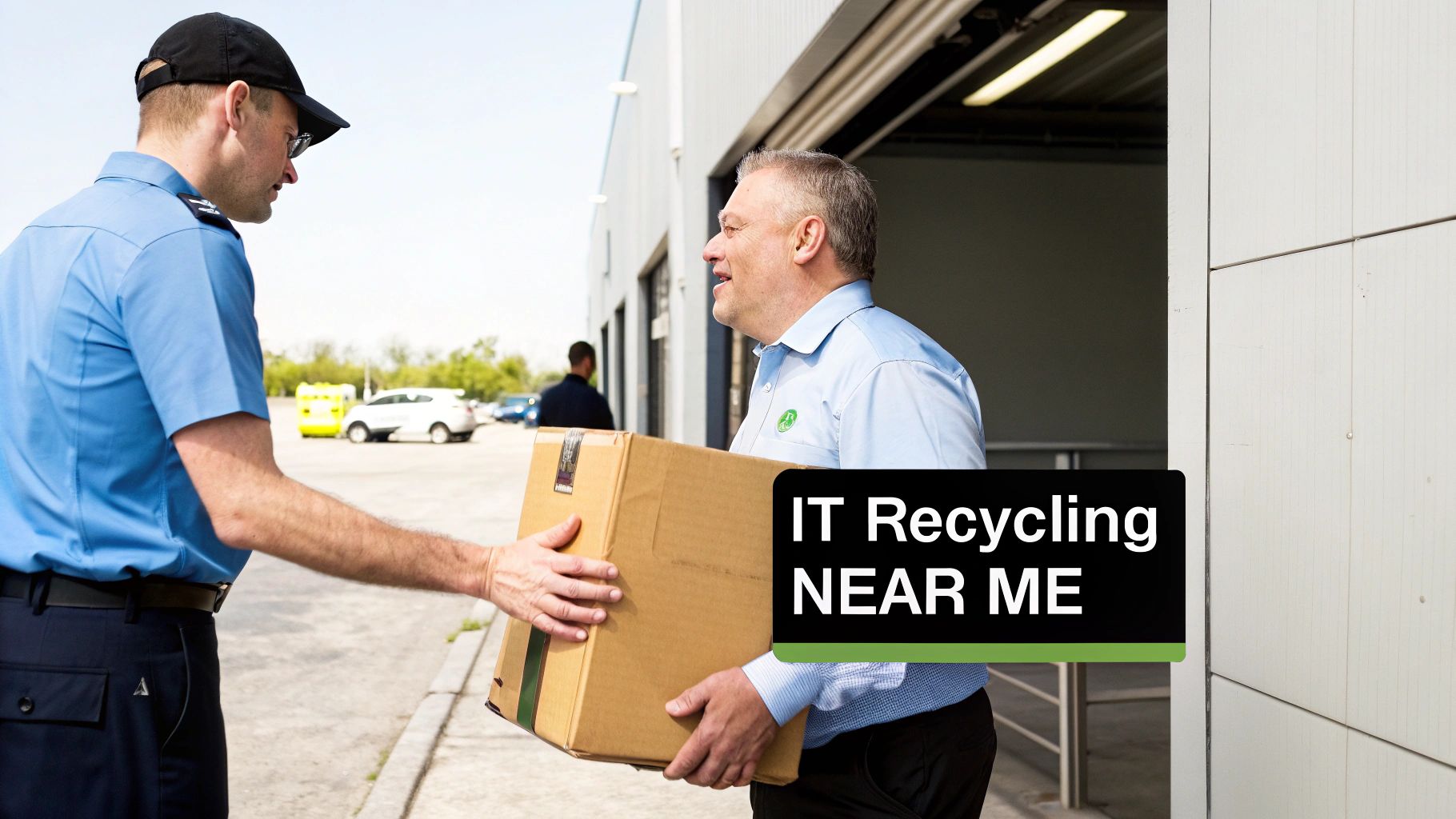
When your Atlanta business searches for "IT equipment recycling near me," the goal is to find a partner who understands these critical commercial requirements. It’s not just about recycling raw materials; it’s about protecting your company’s most valuable asset—its data.
The Hidden Risks of Using Generic E-Waste Services for Corporate Assets
Utilizing a generic e-waste drop-off bin or a residential recycling event for corporate IT assets is a significant gamble for any Atlanta business. These services are designed for consumer electronics like old TVs and microwaves, not for business-grade hardware containing proprietary data and subject to strict regulatory oversight. They lack the necessary security protocols, asset tracking, and certified documentation required for proper corporate IT asset disposition.
This oversight can lead to severe consequences, including data breaches, legal penalties, and lasting reputational damage. When a search for "IT equipment recycling near me in Atlanta" leads to these one-size-fits-all options, businesses expose themselves to unnecessary and avoidable risks.
The Data Security Blind Spot in Consumer Recycling
The primary danger of using non-specialized recyclers is their inadequate approach to data security. A simple file deletion or factory reset is insufficient for permanently erasing data from hard drives or SSDs. Sensitive corporate information, including customer data, employee PII, financial reports, and intellectual property, can often be recovered using readily available software.
Generic e-waste handlers focus on material recovery—sorting scrap metal, plastic, and glass. Your company's hard drives are treated as just another component, with no guarantee of secure data wiping or physical destruction before being processed or passed downstream.
A single data breach can cost a company millions in fines, legal fees, and reputational damage. The average cost of a data breach in 2023 was $4.45 million, making the choice of a secure ITAD partner a critical financial decision, not just an operational one.
Compliance and Chain of Custody Failures
For businesses in Atlanta, disposing of old IT equipment is a matter of legal and regulatory compliance. Environmental laws like the Resource Conservation and Recovery Act (RCRA) and data privacy regulations such as HIPAA, SOX, and GDPR impose strict requirements on how these assets and their data are managed.
A generic recycling service rarely provides the documentation necessary to prove compliance. Without a serialized Certificate of Data Destruction and a detailed Certificate of Recycling, your business has no auditable proof of responsible disposal. This leaves your company exposed to significant penalties if an asset is traced to a landfill or implicated in a data leak. You can learn more about these critical risks by exploring the hidden dangers of improper electronics disposal.
Here’s what you’re missing when you use a generic service:
- Serialized Asset Tracking: No itemized record makes it impossible to confirm which specific laptop or server was destroyed.
- Secure Chain of Custody: Equipment is often handled by multiple, unvetted parties, dramatically increasing the risk of theft or loss.
- Liability Transfer: Without proper certification, the legal liability for the equipment and its data remains with your organization.
The Financial and Reputational Fallout
The consequences of choosing the wrong partner can be severe. Steep fines for environmental violations are a real threat, but the reputational damage from a data breach can be even more devastating. A professional, business-focused ITAD provider is the only secure and logical choice for corporate electronics recycling in Atlanta.
Why Professional IT Recycling Is a Business Necessity
The relentless pace of technological advancement means that corporate IT assets become obsolete faster than ever. This continuous upgrade cycle creates a massive volume of retired equipment, from data center hardware and medical devices to laboratory equipment and laptops. For businesses in Atlanta, managing this e-waste stream has evolved from an environmental nice-to-have into a fundamental operational requirement.
This challenge involves complex logistics, stringent data security mandates, and strict legal compliance. Every decommissioned device represents a potential security vulnerability and a legal liability if not handled correctly. A proactive, professional IT Asset Disposition (ITAD) strategy is essential for mitigating these risks.
The Scale of the E-Waste Challenge
The constant refresh of technology, while vital for competitiveness, generates an unprecedented amount of electronic waste. This mountain of retired tech creates significant compliance pressure. Regulations like HIPAA, GDPR, and SOX apply not only to live systems but also demand the secure handling of data on equipment that has been decommissioned for years.
This growing challenge has fueled a specialized industry dedicated to managing e-waste securely and responsibly. The global market for IT equipment recycling was valued at around USD 25 billion in 2025 and is expected to grow at a Compound Annual Growth Rate (CAGR) of 12% through 2033. This growth is a direct response to the flood of retired electronics and the critical need for certified disposal services. A recent market report dives deeper into what's driving this rapid expansion.
From Cost Center to Strategic Imperative
Failing to manage this process professionally can lead to disaster. A single improperly disposed hard drive can trigger a catastrophic data breach, resulting in massive financial penalties, legal battles, and permanent damage to your company's reputation. Furthermore, environmental fines for incorrect disposal are a significant risk, as many electronic components are classified as hazardous waste.
A professional ITAD program is designed to address these challenges simultaneously:
- Mitigates Risk: Guarantees that all data is completely and irretrievably destroyed, preventing potential breaches.
- Ensures Compliance: Provides auditable documentation, like Certificates of Destruction, to satisfy regulators and auditors.
- Recovers Value: Identifies assets with resale value, helping to offset disposal costs through IT asset recovery.
- Supports Sustainability: Ensures that all materials are recycled responsibly according to strict environmental standards, including product destruction for proprietary devices.
It's crucial to understand that a real ITAD program is more than just recycling. It's a comprehensive, end-to-end process for managing the entire lifecycle of your IT assets. To get a better handle on this, take a look at what IT asset disposition entails and how it shields your business.
Partnering with a certified IT recycling specialist in Atlanta is a business necessity. It transforms a potential liability into a controlled, secure, and documented process that protects your data, ensures compliance, and supports your company’s financial and environmental goals.
Understanding Data Destruction and Compliance
For any business, the single most critical component of the IT recycling process is the permanent and verifiable destruction of sensitive data. Simply deleting files or reformatting a hard drive is dangerously insufficient. When your Atlanta business searches for "it equipment recycling near me," your top priority must be to find a partner who provides certified data destruction.
Failing to do so exposes your company to severe financial penalties, legal action, and irreparable brand damage. A certified data destruction process ensures every byte of data is eradicated, protecting your business from these significant risks.
This decision tree visualizes the straightforward process for determining if your old IT gear needs professional, secure recycling.
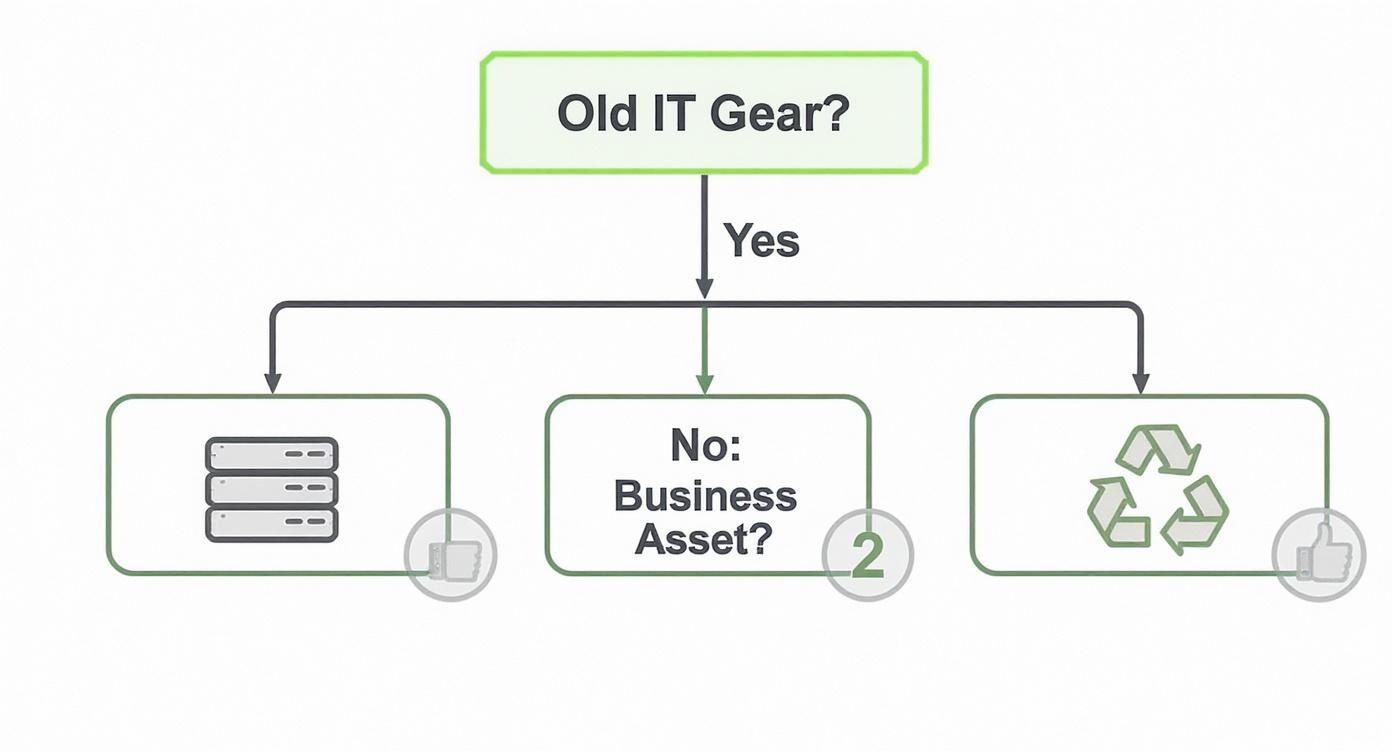
The key takeaway is simple: once an asset is identified as business property, the only compliant path forward is professional recycling. This is the only way to guarantee both data security and environmental responsibility.
Certified Methods for Permanent Data Erasure
Professional ITAD providers use two primary, industry-accepted methods for data destruction, each designed to meet rigorous government and industry standards.
Software-Based Wiping (Data Sanitization):
This method uses specialized software to overwrite a hard drive with random characters, making the original data completely unrecoverable. The gold standard for this process is NIST SP 800-88, a set of guidelines from the National Institute of Standards and Technology. Wiping to this standard is a forensically sound process that ensures every sector of a drive is sanitized. You can get a deeper understanding by reviewing our complete breakdown of the NIST SP 800-88 standards. This method is ideal for newer, functional hard drives that can be refurbished and resold.
Physical Destruction (Shredding):
For older, failed, or highly sensitive drives where complete physical obliteration is non-negotiable, shredding is the ultimate solution. Industrial shredders grind hard drives, SSDs, and other media into small, unrecognizable fragments, making data recovery physically impossible. This method is often required by organizations with the strictest security protocols.
The Critical Role of Compliance and Documentation
Data destruction is incomplete without proper documentation. Your business must be able to prove it followed a secure and compliant process. This is where a professional ITAD partner becomes invaluable.
-
Regulations You Must Consider: Various laws mandate the secure handling of data on retired assets. Key examples include:
- HIPAA: Protecting patient health information.
- SOX (Sarbanes-Oxley Act): Governing financial data for public companies.
- GDPR: Protecting the data of EU citizens.
-
The Certificate of Data Destruction: This is your non-negotiable proof. A credible ITAD provider will issue a serialized Certificate of Data Destruction that lists every asset (by serial number) that was wiped or shredded. This document officially transfers liability from your company to the vendor and serves as your legal record of compliance.
When evaluating an "it equipment recycling near me" service in Atlanta, always demand a sample of their certificate—it’s a clear indicator of their professionalism and commitment to your security.
How to Get Your IT Assets Ready for Secure Recycling
A smooth and secure handover to your IT equipment recycling partner begins with proper internal preparation. Establishing a clear internal process ensures that every device is accounted for, disconnected from your network, and ready for pickup. This prep work minimizes disruption and creates a solid record of what is being decommissioned.
For IT managers, facility managers, and procurement professionals, a clear plan is essential for a streamlined and secure IT asset disposal project.
Create a Final Asset Inventory
Before scheduling a pickup, create a detailed inventory of the equipment you are decommissioning. This list is crucial for your internal records and for providing your recycling partner with an accurate scope of the project.
Your inventory should include:
- Asset Type: Be specific (e.g., Dell Latitude 7490 Laptop, HP ProLiant DL380 Server).
- Serial Number or Asset Tag: A unique identifier for tracking each device.
- Location: The physical location of the equipment (e.g., Data Center Row 5, Storage Closet B).
- Data-Bearing Status: Indicate whether the device contains a hard drive, SSD, or other storage media to ensure it is flagged for destruction.
This inventory serves as your baseline and will be used to verify against the Certificate of Data Destruction provided by your vendor.
Disconnect and Consolidate Your Equipment
To facilitate a quick and efficient pickup, disconnect all assets and gather them in a designated staging area. This simple step saves time and enhances security by limiting the logistics team's access to active work areas or sensitive server rooms.
Best Practice: Designate a secure, accessible staging area, such as a loading dock or a cleared-out storage room. Consolidating the equipment makes the physical collection process faster and safer for everyone involved.
Ensure every device is completely powered down and disconnected from both power and the network. If you plan to retain any peripherals, remove them beforehand. This preparation allows the logistics team to load out the equipment without interrupting your daily operations.
How To Choose The Right IT Recycling Partner

When searching for "it equipment recycling near me," it is critical to select a partner who can protect your business from significant risks. Choosing an IT Asset Disposition (ITAD) partner is a high-stakes decision that impacts your company’s data security, legal compliance, and environmental reputation. Asking the right questions is the only way to distinguish basic scrap haulers from strategic partners.
This isn’t about finding the nearest drop-off point. It’s about finding a certified specialist who can handle the complexities of corporate hardware, from computer recycling and laptop disposal to data center decommissioning.
Verify Industry-Standard Certifications
Certifications are the most reliable indicators of a vendor's commitment to the highest industry standards. They prove that a provider has undergone rigorous third-party audits for data security, environmental controls, and transparent material tracking.
Look for these two critical certifications:
- R2v3 (Responsible Recycling): The leading global standard for electronics recycling. An R2v3-certified facility adheres to strict protocols for data sanitization, environmental protection, and downstream material tracking.
- e-Stewards: This certification focuses on preventing the illegal export of hazardous e-waste to developing countries, guaranteeing the highest level of environmental and social responsibility.
A vendor holding one or both of these certifications has demonstrated a serious commitment to ethical and secure practices.
Scrutinize the Data Destruction Process
A qualified partner must clearly articulate their data destruction methods and provide verifiable proof of execution. Their process should be built around recognized standards, with NIST SP 800-88 being the benchmark for secure data sanitization. A professional will offer both software-based wiping and physical destruction (shredding).
You should also demand a serialized Certificate of Data Destruction for every project. This legal document is your official record that your data was properly handled, transferring liability and protecting your company during an audit. Our detailed guide on the essential criteria for selecting a recycling center provides more information on these requirements.
Confirm Specialized Insurance Coverage
Standard business insurance is insufficient for the risks associated with IT asset disposal. Your partner must carry specialized insurance policies designed to cover the unique liabilities of handling corporate IT assets.
Confirm they have:
- Data Breach Insurance: Covers the financial consequences if a data breach is traced back to equipment they handled.
- Pollution Liability Insurance: Protects against the high costs of an environmental incident, ensuring hazardous materials are managed correctly.
These policies are a clear sign of a vendor's professionalism and financial stability. As you vet potential partners, remember to apply general vendor management best practices to ensure a secure and efficient process.
Your Questions About IT Equipment Recycling, Answered
When it's time to retire corporate technology, business owners, IT managers, and facility managers have critical questions. Getting clear, factual answers is the first step toward making a smart, secure, and compliant decision when searching for "it equipment recycling near me."
What Is the Difference Between ITAD and E-Waste Recycling?
E-waste recycling focuses primarily on recovering raw materials like plastic and metal from electronics to prevent them from entering landfills. It is suitable for consumer goods but lacks the security and documentation required for business assets.
IT Asset Disposition (ITAD) is a comprehensive service for businesses that includes certified data destruction, detailed asset tracking, value recovery through remarketing, and responsible recycling as the final step. For any corporate asset that stored sensitive information, ITAD is the only secure and compliant solution.
Is A Certificate of Destruction Necessary For My Business?
Yes, absolutely. A Certificate of Data Destruction is your official, auditable proof that your company’s data was destroyed in accordance with standards like NIST 800-88. This legal document is essential for demonstrating compliance with regulations like HIPAA, SOX, or GDPR and formally transfers liability from your organization to your ITAD partner.
Can My Company Recover Value From Old IT Equipment?
Yes. Many businesses can generate a significant return from their retired IT assets. An experienced ITAD partner will assess your equipment—especially newer laptops, servers, and networking hardware—for its fair market value. This IT asset recovery process can generate revenue that offsets or even exceeds the cost of recycling older equipment, turning a disposal project into a financial benefit.
What Types of Equipment Do You Accept From Businesses?
A commercial ITAD specialist handles a wide range of business and enterprise technology. This includes data center equipment (servers, storage arrays), office electronics (laptops, desktops, networking gear), and specialized assets such as medical equipment, laboratory equipment, and industrial controls. These services are exclusively for commercial, government, and institutional clients and do not cover residential electronics.
Contact Beyond Surplus for certified electronics recycling and secure IT asset disposal in Atlanta, GA. We provide nationwide pickup services and a complete, auditable solution to protect your data and ensure compliance. Get your free assessment at https://www.beyondsurplus.com.
